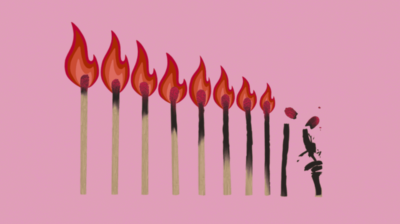What is a chronic illness flare-up?

Living with a chronic illness or long-term health condition can be challenging, not just physically, but mentally and emotionally too. When your energy is limited or your symptoms are unpredictable, you might have days where everyday tasks feel manageable, and other days where you feel completely overwhelmed.
Many people with long-term conditions also experience isolation, self-doubt, or a sense of being misunderstood, especially when their symptoms are not visible to others. If you live with a chronic illness, you may find information in this article that helps to validate your experience and remind you that you’re not alone. If you love or support someone with a chronic illness, this article gives an understanding of what it’s like to live with a fluctuating long-term health condition, especially the experience of chronic illness flare-ups and energy crashes.
In this article, you’ll find information that covers:
The meaning of a chronic illness flare-up
What an “energy crash” is
Common causes of an “energy crash” or chronic illness flare-up
What the “crash-and-burn” cycle is
How to reach out for support
For practical tips on managing energy levels and coping with the emotional and psychological impact of chronic illness, read our article on how to manage a chronic illness flare-up.
What is a chronic illness flare-up?
If you live with a chronic illness, like an autoimmune condition, a neurological condition, or a chronic pain condition, you might experience “good days” and “bad days.” What makes a day “good” or “bad” is different for everyone, and usually depends on the number and intensity of your symptoms on any given day.
A flare-up is when your symptoms suddenly get worse or increase noticeably beyond your usual baseline or day-to-day fluctuations in symptoms. This might mean an increase in fatigue, pain, brain fog, dizziness, or other symptoms, depending on your condition.
Flare-ups can happen for lots of reasons. Sometimes they’re caused by overdoing it physically, mentally, or emotionally. But other times, they seem to come out of nowhere, even when you’re taking it easy and doing everything you can to take care of your health. This unpredictability can be one of the hardest parts of living with a chronic illness.
What is an “energy crash”?
If you live with a long-term health condition where fatigue is a major symptom, you might have heard the term “energy crash.” An energy “crash” happens when your body runs out of energy, often hours or even a day after you’ve done something physically, mentally, or emotionally demanding. This delayed exhaustion can last for days, or even weeks, and often comes with a worsening of other symptoms too.
Energy crashes are a key feature of conditions like chronic fatigue syndrome (CFS), also known as myalgic encephalomyelitis (ME), and Long COVID. In medical terms, this type of crash is called post-exertional malaise (PEM) or post-exertional fatigue. What makes PEM especially difficult is that it often follows everyday activities like cooking, chatting with a friend, showering, or watching a film; things you might have managed easily before becoming unwell.
A person with PEM typically pays a high price. They experience an increase in physical symptoms and fatigue after exceeding the energy that is available to them. Depending on the severity of a person’s condition, this might look like being bedridden or housebound for days.
You can read more about the difference between tiredness and chronic fatigue in this article on the signs and causes of fatigue.
What causes an “energy crash” or chronic illness flare-up?
Many different things can trigger energy crashes and flare-ups, not just physical activity. The kinds of triggers that can lead to an energy crash or chronic illness flare-up vary from person to person. Triggers can include:
- Physical activities, such as household chores, work, and exercise
- Cognitive effort, including reading or writing, and having long conversations
- Sensory exposure to loud, repetitive noises or bright or flashing lights
- Emotional demands, such as challenging interactions or stressful events
- Hormonal changes, like changes during the menstrual cycle
- Environmental triggers, including proximity to allergens, changes in weather, seasonal changes, and temperature changes
Learning to recognise your own triggers is an important part of managing your energy and reducing the risk of flare-ups. However, it’s often not possible to avoid them completely. That’s why practising self-compassion is just as important as breaking up your activities and doing them at a pace that works for you.
What is the “crash-and-burn cycle”
If you find yourself regularly experiencing flare-ups or energy crashes, you might be stuck in what’s sometimes called a crash-and-burn cycle.
This cycle happens when you push beyond the energy you actually have. You may be trying to keep up with everyday life, meet expectations, or get things done on a good day. Pushing beyond your available energy can result in extreme exhaustion. This can make it really difficult to perform everyday tasks for days, weeks, or even months. This cycle can repeat itself if and when you return to your normal energy baseline.
This common pattern can make it really hard to achieve your goals at a steady pace that works for your body, without worsening your symptoms. Crash-and-burn cycles are especially common among people who:
- Live with chronic illnesses like CFS or Long COVID, where energy can be severely limited, and PEM is common
- Are neurodivergent and must spend additional energy navigating environments that do not accommodate their neurodivergent traits and sensory needs
It’s important to know that getting stuck in this cycle isn’t your fault. It doesn’t mean you’re doing anything wrong or that you’re failing. We live in a world that often celebrates productivity above mental and physical well-being. This can make rest feel like laziness. Other factors outside your control often influence a crash-and-burn cycle, like:
- Having to attend school or work without the appropriate supports
- Providing care for others
- Facing pressure to mask or hide who you are or what you’re really going through
As hard as it can be, practising self-compassion can really help. This is especially true on your bad days, can help when you find yourself stuck in the crash-and-burn cycle.
Reaching out for support
If you’re struggling with chronic illness flare-ups or severe illness-related fatigue, you’re not alone. And it’s not all in your head. Whether it’s linked to your physical health, emotional wellbeing, or something still unclear, your experience is valid and deserves attention.
Find out more information on how to access mental health support, from instant messaging support services to finding an accredited counsellor or psychotherapist.
You can also find helpful tips and coping strategies in our articles on how to manage a chronic illness flare-up and how to find social support for your chronic illness.
Feeling overwhelmed and want to talk to someone?
- Get anonymous support 24/7 with our text message support service
- Connect with a trained volunteer who will listen to you, and help you to move forward feeling better
- Whatsapp us now or free-text SPUNOUT to 50808 to begin.
- Find out more about our text message support service
If you are a customer of the 48 or An Post network or cannot get through using the ‘50808’ short code please text HELLO to 086 1800 280 (standard message rates may apply). Some smaller networks do not support short codes like ‘50808’.






